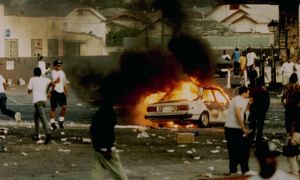LA 92 (2017)
LA 92 was released on April 21, 2017, in the USA. The documentary film was produced by National Geographic. The movie was directed by Daniel Lindsay and T.J. Martin[1].. The film was released on the 25th anniversary of the Rodney King trial[2].
Plot

The film begins in 1965 where there was a riot in LA. The brief recaps then move to the appointment of Daryl Gates as the Chief of the Los Angeles Police Department (LAPD). Then, in 1991, Rodney King is beaten by LAPD officers, and its incident is captured on videotape. At the same time, another incident occurred as Latasha Harlins, a 15-year-old African American girl, was killed by Soon Ja Du, a convenience store owner. Soon Ja Du believed that the girl was trying to do shoplifting. The situation went even more intense as the LAPD officers were acquitted from their trial. This lead to chaos as African Americans wanted equal justice. Riots and violence occurred where most people brought their own weapons. The Korean-owned businesses, African Americans, and LAPD officers fought fiercely while buildings were burnt down to ashes. There was looting during the tragedy, while the National Guard was outside the city as they stated that they were lack of ammunition. In the end, dozen of people died and thousands of people injured. The incident caused a $1 billion loss as the property has burnt and many goods were looted. The incident is considered the most destructive riot in USA history [4].
Controversy
The film exposes that the killer of Latasha Harlins was waived from imprisonment entirely, only got probation, doing community services, and a $500 fine. The justice was not served as the jury believes the killer was guilty of voluntary manslaughter with a sentence of up to 16 years in prison. The film also portrays the videotape of how Rodney King, an African American, got beaten by the LAPD officers. He even got a Taser burnt from the incident as he did not fight back at all[5].
References
- ↑ https://www.imdb.com/title/tt6794424/?ref_=nv_sr_srsg_0
- ↑ https://www.theguardian.com/film/2017/apr/20/la-92-review-arresting-footage-of-the-riots-that-rocked-the-city
- ↑ https://i.guim.co.uk/img/media/728ebfce4b011ebc1d2b503f91ad1c16cc0d14fd/5_201_2995_1798/master/2995.jpg?width=700&quality=45&auto=format&fit=max&dpr=2&s=58c2977833f639b8b28f8488f72340a4
- ↑ https://decider.com/2020/06/09/la-92-on-netflix-stream-it-or-skip-it/
- ↑ https://www.hollywoodreporter.com/review/la-92-996397